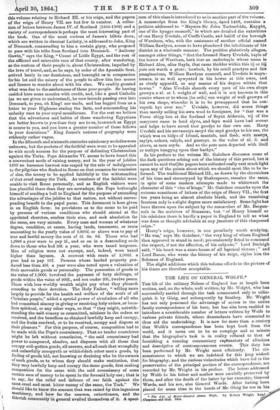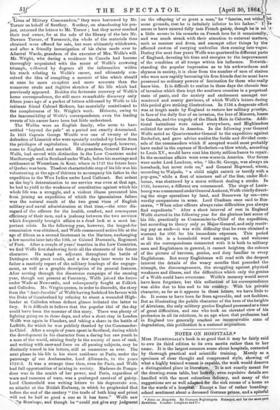THE LIFE OF GENERAL WOLFE.*
Tim life of the military Nelson of England has at length bear written, and, on the whole, well written, by Mr. Wright, who has successfully carried through the task commenced only to relin- quish it by Gleig, and subsequently by Southey. Mr. Wright- has not only possessed the advantage of access to the entire family correspondence of his hero, but has also been enabled to introduce a considerable number of letters written by Wolfe to- various private friends, whose descendants have consented to- thus aid the undertaking. It is now for more than a century that Wolfe's correspondence has been kept back from the world, and it turns out to be so compile and so minute that the biographers task is in reality reduced to that of furnishing a running commentary explanatory of allusions and descriptive of contemporaneous events. This duty has been performed by Mr. Wright most efficiently. The cir- cumstances to which we are indebted for this long wished- for biography, and the curious vicissitudes which have led to the preservation of the principal portion of the correspondence, are recorded by Mr. Wright in his preface. The letters addressed by Wolfe to his father and mother were carefully preserved by. them, and after the death of the latter by her executor, General Wards, and his son, also General Warde. After having been placed for some time in the hands of Mr. Gleig for use in his * The Life of Mojor-Gencrai Jaws Wolfe. By Hubert Wright. Lowl • Chapman and Hall. 1864.
ves of Military Commanders," they were borrowed by Mr.
II -
Turner on behalf of Southey. Smithey, on abandoning his pro-
ject, returned the letters to Mr. Turner ; but they never reached their real owner, for at the sale of the library of the late Mr. Dawson Turner, of Yarmouth, the whole of the materials thus obtained were offered for sale, but were ultimately withdrawn, and after a friendly investigation of his claim made over to Admiral Warde, grandson of the executor of Mrs. Wolfe's will Mr. Wright, who during a residence in Canada had become thoroughly acquainted with the scene of Wolfe's crowning triumph, collected by degrees all the information within his reach relating to Wolfe's career, and ultimately con- ceived the idea of compiling a memoir of him which should at once be more complete and more accurate than the numerous crude and fugitive sketches of his life which had previously appeared. Besides the fortunate recovery of Wolfe's home correspondence, the still more remarkable discovery only fifteen years ago of a packet of letters addressed by Wolfe to his intimate friend Colonel Rickson, has materially contributed to the completeness of Mr. Wright's work. Hitherto, owing to the inaccessibility of \Voile's correspondence, even the leading events of his career have been but little understood.
The Wolfes were an English family, who seem to have settled "beyond the pale" at a period not exactly determined. In 1651 Captain George Woulfe was one of twenty of the defenders of Limerick who were specially excluded by Ireton from the privileges of capitulation. He ultimately escaped, however, came to England, and married. His grandson, General Edward Wolfe, had served with distinction in the Low Countries under Marlborough and in Scotland under Wade, before his marriage and settlement at Westerham, in Kent, where in 1727 the future hero of Quebec was born. Thcofirst characteristic step of his life was his volunteering at the age of thirteen to accompany his father in the expedition to the West Indies under Lord Cathcart. But ardent as the boy's determination to see service was even at that age, he had to yield to the weakness of constitution against which his whole life was a struggle, and a violent illness prevented him from joining an expedition of which the ignominious failure was the natural result of the two great vices .of English military and naval administration at that time,—the utter dis- regard of the officers for the health, comfort, and consequent efficiency of their men, and a jealousy between the two services which frequently brought affairs to a dead lock at a most im- portant crisis. In the following year, however, the longed-for commission was obtained, and Wolfe commenced active life at the age of fifteen as a second lieutenant in the Marines, exchanging a few months later into the 12th, or Colonel Duroure's, Regiment of Foot. After a couple of years' inaction in the Low Countries, we find Wolfe first shadowing forth all the elements of his future character. He acted as adjutant throughout the battle of Dettingen with great credit, and a few days later wrote to his father a masterly report of the military bearings of the engage- ment, as well as a graphic description of its general features. After serving through the disastrous campaign of the ensuing year, though not present at Fontenoy, Wolfe joined the forces under Wade at Newcastle, and subsequently fought at Falkirk and Culloden. Mr. Wright quotes, in order to discredit, the story from the "Anti-Jacobin" of 'Wolfe having forfeited his favour with the Duke of Cumberland by refusing to shoot a wounded High- lander at Culloden whose defiant glance irritated the latter to fury. It is difficult to believe that the popular idol of the day could have been the monster of this story. There was plenty of fighting going on in those days, and after a short stay in London Wolfe was again in Flanders, and taking a share in the battle of Laffeldt, for which he was publicly thanked by the Commander- in-Chief. After a couple of years spent in Scotland, during which the development in his character from a daring but raw youth to a man of the work', mixing freely in the society of men of rank, and writing with easesand force on all passing subjects, may be distinctly traced in his letters, still as numerous as ever. The next phase in his life is his short residence at Paris, under the patronage of our Ambassador, Lord Albemarle, in the years 1752-3. It was a strange time then, even for Paris, and Wolfe had full opportunities of mixing in society. Madame de Pompa- dour was in the zenith of her power, and Paris, regardless of wars and rumours of wars, was a prolonged carnival of gaiety. Lord Chesterfield was writing letters to his degenerate son, an attaché at the British Embassy, in which he prophesied that before the end of the century "the trade of both king and priest will not be half so good a one as it has been." Wolfe saw p Stanhope, and though be "could not give any judgment on the offspring Of so great a man," he "fancies, not witho ut some grounds, that he is infinitely inferior to his father." II e seems to have entered fully into French gaiety, though he is nok t ' a little severe in his remarks on French love for it occasionally," \ and was much struck with their attention to external matters, such as manner and dress, and amongst other things by the affected custom of carrying umbrellas then coming into vogue. During the next four years Wolfe was quartered in different parts of England, devoting his time and energies to the improvement of the condition of all troops within his influenCe. Notwith- standing the popular impression as to his awkwardness and shyness in society, it is clear from the number of men of station who were now rapidly becoming his firm friends that he must have possessed no ordinary powers of fascination for those who really knew him. It is difficult to realize in these days the chronic fear of invasion which then kept the southern counties in a perpetutd state of panic, and the anxiety and excitement amongst our scattered and scanty garrisons, of which Wolfe's letters during this period give striking illustrations. In 1756 a desperate effort was at length made by England to restore her military prestige, in face of the daily fear of an invasion, the loss of Minorca, losses in Canada, and the tragedy of the Black Hole in Calcutta. Addi- tional battalions' were raised everywhere, and Highlanders enlisted for service in America. In the following year General' Wolfe acted as Quartermaster-General to the expedition againkt Rochefort, and gave advice amidst the feeble aud divided coun- sels of the commanders which if accepted would most probably have ended in the capture of Rochefort—a blow which, according to Louis XV., would have cost him thirty million francs to repair.. In the meantime affairs were even worse in America. Our forces were under Lord Loudoun, who, "like St. George, was always on horseback, but never rode on," and General Hopwood, whom, according to Walpole, "a child might outwit or terrify with a pop-gun," while a fleet of nineteen sail of the line, under Hol- borne, was shattered by a storm without dealing a stroke. In 1758, however, a different era commenced. The siege of Louis- bou rg was commenced under General Amherst, Wolfe chiefly direct- ing the siege operations by land, and Boscawen by sea—two worthy companions in arms. Lord Chatham once said to Iles- cawen, "When other officers always raise difficulties you always find expedients." After a short interval of rest in England Wolfe started in the following year for the glorious last scene of his life, practically as Commander-in-Chief of the expedition, but according to theory only as Major-General, and only receiv- ing pay as such—it was with difficulty that he even obtained a warrant for 500/. for his immediate expenses. This period of his life is a household word amongst us, and welcome as all the correspondence connected with it is both to military men and Englishmen in general, it cannot heighten the colours of the picture of heroism, genius, and duty familiar to every Englishman. But every Englishman will read with the deepest interest the details of the weary months that preceded the triumph, the discouragements, the struggling against physical weakness and illness, and the difficulties which only the genius of a Wolfe could have overcome. Wolfe's memory would never have been forgotten, but this collection of his correspondence was alike due to him and to his cotintry. With his private character, as far as it appears in these letters, we have little to do. It seems to have been far from agreeable, and not faultless. But as illustrating the public character of the hero of the heights of Abraham, the only military genius England possessed at a time of great difficulties, and one who took an elevated view of his profession in all its relations, in an age when that profession had in England too' generally reached an inconceivable state of degradation, this publication is a national acquisition.



































 Previous page
Previous page